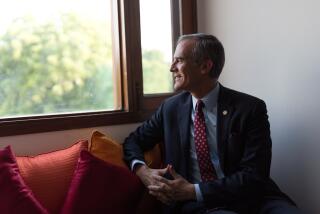U.S. to Boost Nuclear Aid to India
- Share via
WASHINGTON — President Bush and Indian Prime Minister Manmohan Singh announced a series of initiatives Monday to strengthen ties between their countries, including increased U.S. assistance for India’s civilian nuclear program.
U.S. officials said they agreed to the new aid after India pledged for the first time to accept international oversight of its civilian nuclear program and continue its moratorium on nuclear weapons testing. In the past, Washington has rebuffed requests for nuclear assistance because India has refused to sign the Nuclear Nonproliferation Treaty.
But U.S.-Indian relations have been steadily improving, as Cold War-era grudges have abated and more recent concerns about India’s nuclear weapons have eased. Washington increasingly views New Delhi as an important commercial partner and geopolitical ally whose interests are generally aligned with America’s.
“Because of our shared values, the relationship between our two countries has never been stronger,” Bush said, standing with Singh in the East Room of the White House. “We’re working together to make our nations more secure, deliver a better life to our citizens and advance the cause of peace and freedom.”
Besides the civilian nuclear agreement, the two leaders approved programs to promote democracy, fight terrorism, combat AIDS, increase trade in high technology and collaborate on disaster relief, energy development, scientific research, space exploration and satellite projects. But Bush rebuffed Singh’s request to support his nation’s bid to become a permanent member of the U.N. Security Council with veto power.
Foreign policy analysts described the initiatives as significant, although not necessarily groundbreaking, and said they underscored the substantial shift in U.S.-Indian relations that began after the Soviet Union’s collapse and accelerated as India undertook economic and democratic reforms.
“This is another public step in the transformation from a rather scratchy relationship between the most powerful industrialized country and the biggest of the developing countries,” said Teresita Schaffer, South Asia program director at the Center for Strategic and International Studies, a Washington think tank. “The new style is a relationship between two countries that see themselves as having a global role that’s relatively compatible.”
Administration officials said the nuclear power agreement was the most significant and sensitive accord endorsed by the two leaders. If accepted by Congress and key U.S. allies, it will relax restrictions that have prevented India from obtaining advanced technology and fuel for nuclear power programs to help meet the energy needs of its rapidly expanding economy and growing population.
U.S. officials said they agreed to increase cooperation after receiving specific assurances from India that it would separate its civilian and military nuclear programs, subject its civilian nuclear facilities to international monitoring and inspections, refrain from transfers of enrichment or reprocessing technologies to other countries and ensure the safety and security of nuclear materials.
In return, the United States agreed to work with India to achieve “normal cooperation” on civilian nuclear energy development, seek congressional approval of necessary changes in U.S. law and press other nations to change international accords that restrict India’s access to nuclear technology.
“For us to be able to cooperate in terms of peaceful nuclear research and cooperation, we had to have these assurances,” said R. Nicholas Burns, undersecretary of State for political affairs. “We were able to secure these assurances.”
India detonated its first nuclear device in 1974. A series of nuclear tests in 1998 were quickly answered by its neighbor and rival Pakistan.
India’s efforts to acquire advanced technology have been complicated by its refusal to sign the Nuclear Nonproliferation Treaty, and the potential objections of other countries to relaxing its access to “dual-use” technologies, which can be adapted to military or civilian use.
Burns said the U.S. was unable to persuade India to reverse course and sign the treaty. As a result, he said, the U.S. rejected India’s request for formal recognition as a nuclear weapons state.
The agreements were announced midway through Singh’s first visit to the United States since becoming prime minister last year. Besides Singh’s private meeting with Bush, he and his wife received a ceremonial welcome on the South Lawn featuring a fife and drum corps, and attended a black-tie dinner in the State Dining Room, where the tables were draped with saffron silk and the menu included roasted halibut, basmati rice, and mango, cashew and chocolate-cardamom ice creams.
Singh promised to move quickly to carry out the accords and said Bush had accepted his invitation to make his first presidential trip to India soon. “We are confident that the results of the understanding that we have reached today would be fully evident by then,” he said.
Administration officials acknowledged that Bush had given no ground on India’s efforts to become a permanent member of the Security Council, which would give it the same veto power over United Nations actions as the U.S., China, Russia, Britain and France.
Bush did not mention the Security Council in his public remarks. Singh referred to it in passing, saying that India had “a compelling case for permanent membership” and that he and Bush had agreed that U.N. decision-making processes should be changed to reflect “contemporary reality.”
The United States has endorsed a request by Japan to become a permanent council member, but it has refused so far to embrace similar bids by India, Germany and Brazil, each of which has a large population and economy.
U.S. officials said Bush reiterated to Singh that the United States understood India’s desire for permanent membership but that it would continue to limit its support to Japan because it believed a bigger expansion of the permanent membership might diminish the council’s effectiveness.
More to Read
Sign up for Essential California
The most important California stories and recommendations in your inbox every morning.
You may occasionally receive promotional content from the Los Angeles Times.










